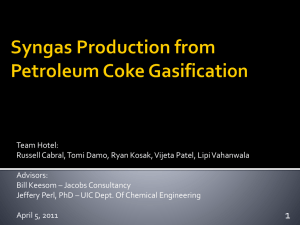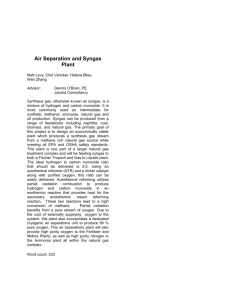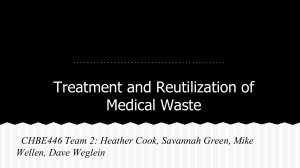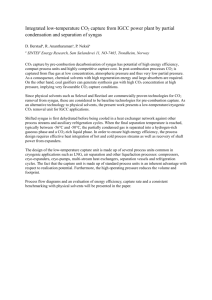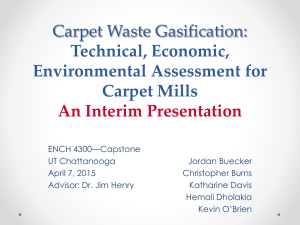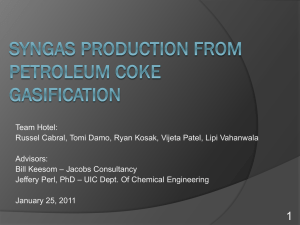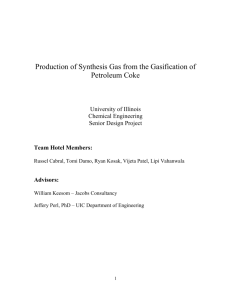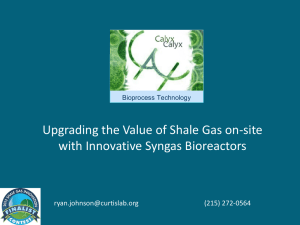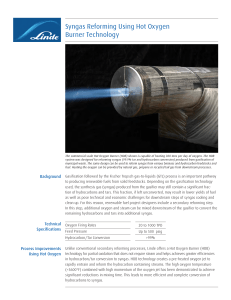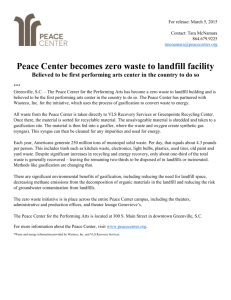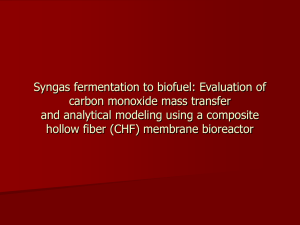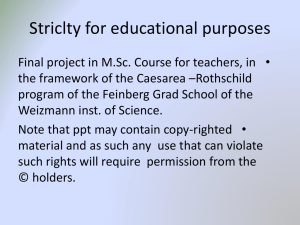Petroleum coke gasificaiton
advertisement
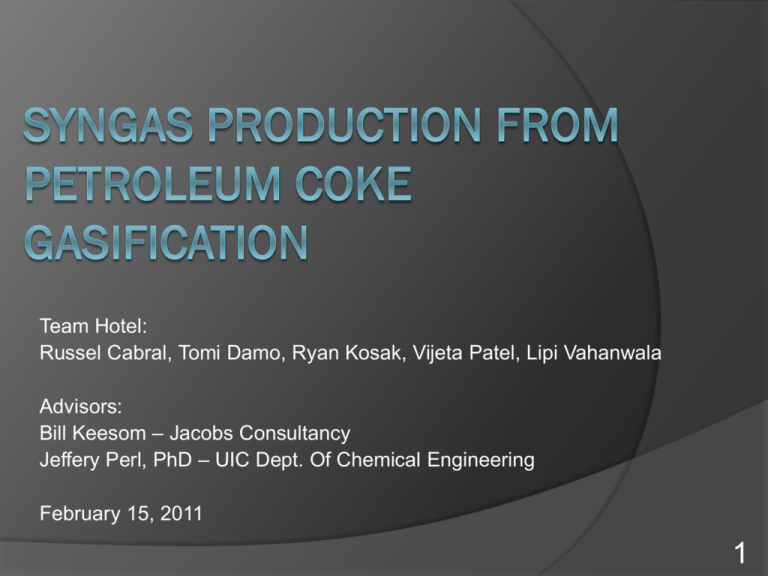
Team Hotel: Russel Cabral, Tomi Damo, Ryan Kosak, Vijeta Patel, Lipi Vahanwala Advisors: Bill Keesom – Jacobs Consultancy Jeffery Perl, PhD – UIC Dept. Of Chemical Engineering February 15, 2011 1 Review from Presentation 1 Petroleum Coke Definition Block Flow Gasifier Comparisons Environmental Concerns Location: Gulf Coast Sulfur Concerns CO2 Concerns 2 Today’s Objectives Discuss why we chose the Shell Membrane Gasifier To present the overall process flow Gasifer Syngas Cleaning ○ Sulfur Removal Water Gas Shift To present our material and energy balance Works in progress 3 Project Purpose Producing syngas from petcoke to be used by Team Golf for production of acetic acid 2730 tons/day of syngas Desired CO to H2 ratio – 1:2.4 molar ratio Desired C to H ratio – 1:4.4 molar ratio Desired Temperature and Pressure ○ 250°F ○ 435 psi 4 Process Overview 3086 tons/day of Petcoke 6791 tons/day of Raw Syngas Gasifier 2997 tons/day of O2 / N2 408 tons/day of H2 Syngas Cleaning / Shift 2322 tons/day of CO 708 tons/day of water 5 Which Gasifier Fits Better with Our Needs? Our Chem Production Team, Golf, requires pure syn gas with minimal amount of Sulfur. We need more conversion of Sulfur to H2S, rather than to Carbonyl Sulfide because it is easier to remove H2S compare to Carbonyl Sulfide. 6 SCGP better than E-Gas and Texaco Shell E-Gas Texaco Q Wall Membrane Wall Refractory Wall Feedstock Dry Slurry Syngas Conversion Higher than 99% Lower than 99% Lower Higher 8,370 Quench 10,350 Quenching by recycle 8,550 11,000 9,300 11,300 Chemical Quench Radiant Syngas (forms tar) cooler (Forced five Outages) 7 8 9 Quench At the outlet of the gasifier reactor the temperature of the syngas is around 1500°C and the fly ash (or slag) is in liquid form. To protect downstream process equipment from fouling, a quench is needed to solidify the slag and make it non-sticky. There are four types of quenches: Water quench Radiant quench Quenching by Recycle Chemical quench 10 Quenching By Recycle Used in Shell Coal Gasifier After particle removal in the candle filter, about half of the syngas flow which has a temperature around 600°F is recompressed and recycled to the gasifier outlet. By mixing the 2700°F hot syngas with the recycle stream, a cooling down to around 1650°F is achieved. Heat is then recovered in a convective syngas cooler. 11 Syngas Cleaning Raw syngas sent to DSR then through a filter Raw syngas is sent to an absorber MDEA (methyldiethanolamine) Solvent Regeneration (Reboiler) Second absorber section for CO2 removal H2, CO, and very litte CO2 sent to WGS H2S in acid gas sent to Claus Plant 12 Claus Plant H2S burnt in a furnace with O2 and air H2S + 1½ O2 ←→ SO2 +H2O 2 H2S +SO2 ←→ 2 H2O+ 3/8 S8 3 H2S + 1½ O2 ←→ 3 H2O+ 3/8 S8 Heated, passed over an alumina catalyst, and condesned multiple times Combusted at 1832 - 2192°F Cooled then reheated to 392 - 572°F for reactors 3 Claus reactors 13 WGS Blocks An reversible exothermic reaction CO + H2O < ---- > CO2 + H2 ( -17,706 BTU/lb-mole) Equilibrium dependant on temperature but not pressure Typical shift are done in two steps a hot and a cold HTS LTS 750 F Cooler 390F Catalysts Ferro-Chrome (Fe3O4 Cr2O3) for HTS Copper Zinc (Cu Zn) for LTS ○ Cobalt Molybdenum (Co Mb) for sulfur contents LTS 14 Flow Sheets 15 Flow Sheets (Part 1) 16 Flow Sheets (Part 2) 17 Material Balance Assumptions Assuming petcoke is converted according to literature Assuming only 90% (mole) CO2 is absorbed into absorbers along with all H2S, COS, H2O Assuming all water reacted with CO, 100% conversion If no split then only 58.79% CO needs to get converted 18 Material Balances 19 Material Balances 20 Energy Balance 21 Energy Balance Continued 22 Cost of Petroleum Coke Cost Basis: 2010 Avg. Petroleum Coke through November 4.8 % Sulfur content $60.95 per ton $121,900 per day $4.5 million per year Electric Power Monthly February 2011 23 Short Equipment List Gasifier Gasifier (qty 2), Syngas Cooler(qty 2), Synthetic gas Cyclone ASU (Qty 2) Oxygen Compressor, Nitrogen Compressor Syngas Cleanup Sulfur Plant, Water Gas Shift Reactors Cooling Water System Circulating Water Pump, Cooling Tower 24 Nitrogen and Oxygen Supply Currently looking at Linde and Praxair Deciding on either on-site production or Pipeline Able to supply O2 and N2 at any required pressure and purity Looking to be Cost effective 25 Report Outline Final Report: Executive Summary Discussion Recommendations Appendices Design Basis: IP Block Flow Diagram: IP Process Flow Showing Major Equip.: N/A 26 Report Outline Appendices (Continued) Material and Energy Balances: IP Calculations: IP Annotated Equip. List: N/A Econ. Eval. Factored from Equip. Costs: N/A Utilities: IP Conceptual Control Scheme: N/A Major Equipment Layout: N/A 27 Report Outline Appendices (Continued) Distribution and End-use Issues: N/A Constraints Review: IP Applicable Standards: N/A Project Communications File: IP Information Sources and References: IP 28 References http://www.andrew.cmu.edu/user/kmeister/egroup/bin/Holt_SummaryIGCC_Cost _CCS_03.pdf Electric Power Monthly February 2011 Higman, Chris, and Maarten Van Der. Burgt. Gasification. Amsterdam: Gulf Professional Pub./Elsevier Science, 2008. Print. Holt, Neville, Gorge Booras, and Douglas Tadd. A Summary of Recent IGCC Studies of CO2 Capture for Sequestration. Summary. Carnegie Mellon Community, Oct. 2003. Web. 13 Feb. 2011. <http://www.andrew.cmu.edu/user/kmeister/egroup/bin/Holt_Summ aryIGCC_Cost_CCS_03.pdf>. http://www.lenntech.com/periodic/elements/ Moran, Michael J., and Howard N. Shapiro. Fundamentals of Engineering Thermodynamics. Hoboken, N.J. : Chichester: Wiley; John Wiley, 2008. Print. Maurstad, Ola. An Overview of Coal Based Integrated Gasification Combined Cycle (IGCC) Technology. Rep. Cambridge: Massachusetts Institute of Technology, 2005. For Energy and Environment. Scribd. Web. 2 Feb. 2011. <http://www.scribd.com/doc/35269273/24/Syngas-quenching>. 29
